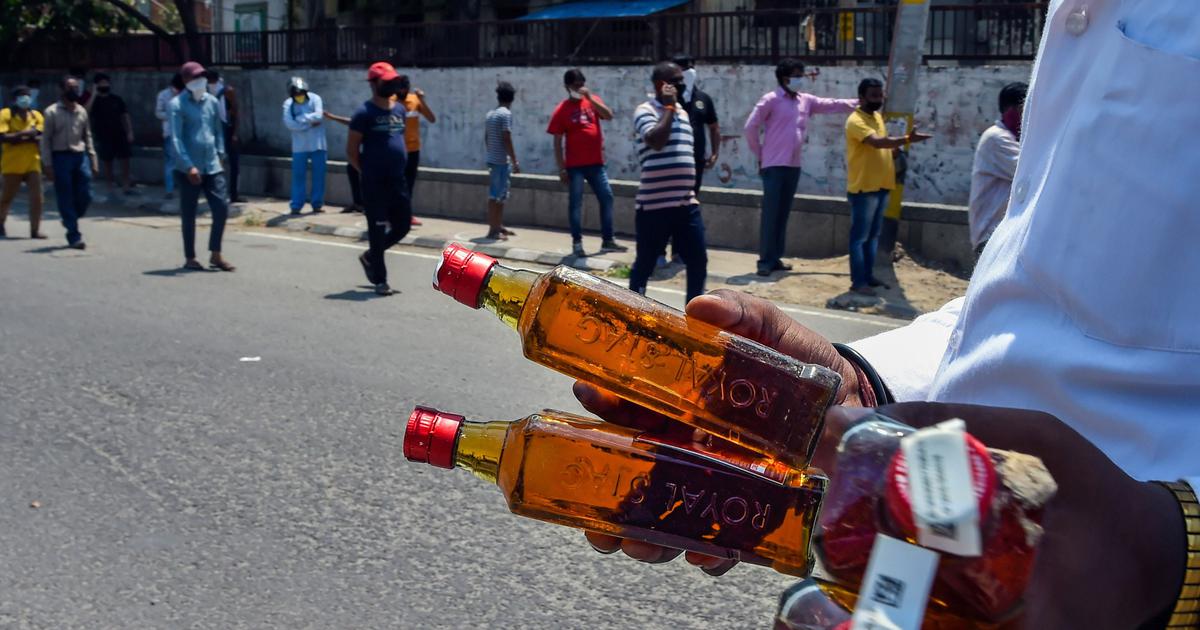Recently, several states including Karnataka, Maharashtra, Haryana, Rajasthan, Kerala, Tamil Nadu and Goa, have informally requested the central government to allow the opening of liquor stores amid the COVID-19 lockdown.
The country has been in lockdown for more than 40 days now, and the economic burden it has caused is evident. Since most economic activity is halted, state governments have lost millions in revenue. The Delhi government’s revenue fell from ₹3,500 crores in April 2019 to ₹300 crores in April 2020. The states’ request to allow liquor sales was due to this sudden financial crunch; mainly as taxes on alcohol is one of the largest sources of revenue for many states.
On 4th May, when lockdown 2.0 ended, and 3.0 started, standalone alcohol shops were allowed to open up. Soon afterwards, photographs of long queues of people waiting to purchase their beloved liquor after a hiatus of 40 days made rounds in the news cycle and social media. This was problematic as social distancing and safety norms were being openly flouted. In an apparent move to discourage overcrowding, and to raise revenue to combat COVID-19, Delhi CM Arvind Kejriwal issued a late-night order announcing 70 per cent extra tax on liquor from 5th May, calling it a “special corona fee”.
The second motive runs against the initial reason as to why these shops were allowed to open in the first place; to spur economic activity. Unreasonably high taxes on a product discourage its purchase and consumption. By deliberately ordering an unreasonably high tax on alcohol, the Delhi government is likely to lose revenue.
Let’s understand this with an example; suppose there is a 70 per cent tax on alcohol. In this case, a liquor bottle that costs Rs.100 will be sold for Rs. 170. Hypothetically, let’s assume that in this scenario, only well-off people will buy alcohol – let’s say, 100 people. The revenue, in this case, will be Rs. 100 X 70 = Rs. 7,000. Now, suppose the tax was a reasonable 35 per cent. In this case, a Rs.100 bottle will be sold for Rs.135. Since it is cheaper to buy, a considerably larger number of people will buy, let’s assume 250. In this case, the revenue will increase to Rs. 8750.
Apart from a few fortunate people who still have their jobs, millions of people are bearing the brunt of this lockdown. Experts like Raghuram Rajan have argued that the lockdown needs to be phased out and economic activity needs to be revived, and rightly so. The step of allowing liquor sales is supposed to be one in that direction. But paired up with a 70 per cent tax hike, this move is counterproductive and would not benefit as much as it could.
It is indeed high time that we begin opening up the economy. Phasing out the lockdown means opening up different industries and markets steadily. There are multiple ways to carefully open up the economy, one of which could be a rotation of shops in markets to avoid overcrowding. Opening up multiple businesses will generate a flow of revenue, which means more opportunity for the government to charge a reasonable “corona fee” on different products; one that does not put an unfair burden on the people.
The problem of overcrowding will automatically go away as more shops open along with effective options like home delivery. It is not at all surprising that people queued up outside liquor stores after 40 days of sobriety. A few governments have already started encouraging home delivery; the Chhattisgarh government itself launched a website for this to avoid crowds at wine shops.
It would be wise to accept that things are not going to be “normal” for a long time to come. Social distancing will become the norm, and we will all enter the “post-lockdown world” armed with safety measures to protect ourselves. Policies and behaviours will adapt to the “new normal”, and we will probably see innovation like never before. It took a pandemic for us to start thinking about home delivery of alcohol as a legal option. Hopefully, in the new world, we will see more sensible reforms in behaviours and policies.
Read more: Should Schools Waive Fees During Lockdown?
Post Disclaimer
The opinions expressed in this essay are those of the authors. They do not purport to reflect the opinions or views of CCS.





